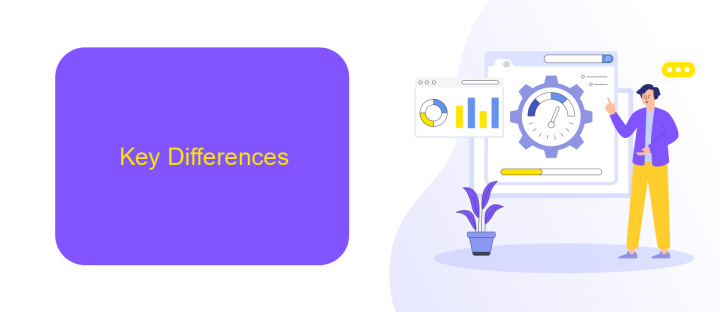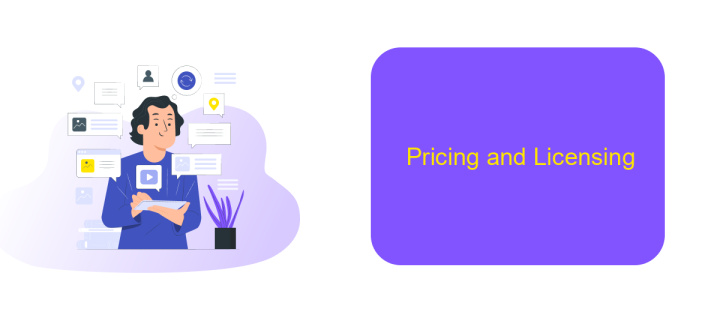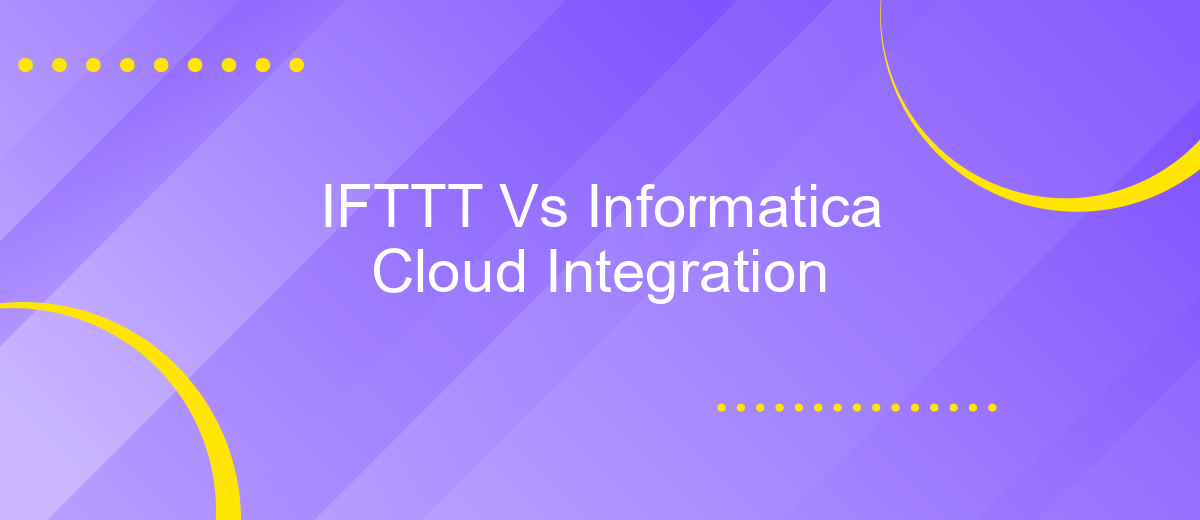IFTTT Vs Informatica Cloud Integration
In today's fast-paced digital landscape, efficient data integration is crucial for businesses striving for seamless operations. This article delves into a comparative analysis of IFTTT and Informatica Cloud Integration, two prominent platforms offering distinct approaches to data connectivity. By examining their features, strengths, and use cases, we aim to provide insights that help organizations make informed decisions tailored to their specific integration needs.
Introduction
In today's rapidly evolving digital landscape, businesses are increasingly relying on automation and integration tools to streamline their operations. Two prominent players in this space are IFTTT and Informatica Cloud Integration. Both platforms offer unique features and capabilities that cater to different business needs, making it essential to understand their strengths and weaknesses.
- IFTTT (If This Then That) is a user-friendly tool designed for simple automation tasks, allowing users to create "applets" that connect various apps and devices.
- Informatica Cloud Integration is a robust enterprise-grade solution that provides comprehensive data integration and management services, suitable for complex business environments.
While IFTTT excels in ease of use and quick setup, Informatica Cloud Integration offers advanced features for data transformation and governance. Additionally, platforms like ApiX-Drive can further enhance your integration strategy by providing seamless connectivity between various applications and services. Understanding the key differences and use cases of these tools will help businesses make informed decisions to optimize their workflows.
Key Differences

IFTTT and Informatica Cloud Integration serve different purposes and cater to distinct user bases. IFTTT (If This Then That) is designed for individual users and small businesses looking for simple automation solutions. It allows users to create applets that connect various services and devices with minimal technical knowledge. In contrast, Informatica Cloud Integration is tailored for enterprises requiring robust data integration and management solutions. It offers comprehensive tools for data synchronization, transformation, and governance, making it suitable for complex business environments.
Another key difference lies in the customization and scalability of the two platforms. IFTTT provides limited customization options and is best for straightforward tasks. On the other hand, Informatica Cloud Integration offers extensive customization capabilities and can handle large-scale data operations. For businesses seeking a middle ground, services like ApiX-Drive can be considered. ApiX-Drive offers an intermediate solution with more customization than IFTTT but without the complexity of Informatica, making it ideal for medium-sized businesses needing flexible integration options.
Use Cases

When it comes to choosing between IFTTT and Informatica Cloud Integration, understanding their use cases can help make an informed decision. Both platforms offer unique advantages depending on the specific needs of your business or project.
- IFTTT: Ideal for simple, consumer-level automations such as connecting smart home devices, social media platforms, and basic task management. For example, you can automate posting Instagram photos to Twitter or turning on your lights when you arrive home.
- Informatica Cloud Integration: Best suited for complex, enterprise-level data integrations and ETL (Extract, Transform, Load) processes. This platform excels in integrating disparate data sources, ensuring data quality, and managing large-scale data workflows. It's perfect for businesses needing robust data governance and compliance features.
- ApiX-Drive: A versatile tool that can bridge the gap between the simplicity of IFTTT and the complexity of Informatica. ApiX-Drive allows for easy setup of integrations without requiring deep technical knowledge, making it suitable for SMBs looking to automate workflows between various SaaS applications.
In summary, IFTTT is great for straightforward, everyday automations, while Informatica Cloud Integration is designed for comprehensive, enterprise-level data management. ApiX-Drive serves as a middle ground, offering user-friendly integration capabilities that cater to both small and medium-sized businesses.
Pricing and Licensing

When comparing IFTTT and Informatica Cloud Integration in terms of pricing and licensing, it’s important to recognize the distinct approaches each platform takes. IFTTT offers a freemium model, where users can access basic features for free and opt for a Pro plan to unlock more advanced functionalities. This allows individual users and small businesses to start automating tasks without any initial investment.
Informatica Cloud Integration, on the other hand, provides a more enterprise-focused pricing structure. It typically requires a subscription-based model, which can vary significantly based on the scale and complexity of the integration needs. Informatica often tailors its pricing to the specific requirements of larger organizations, ensuring robust support and extensive capabilities.
- IFTTT: Freemium model with Pro plans starting at .99 per month.
- Informatica Cloud Integration: Subscription-based pricing, customized per enterprise needs.
For those looking for an alternative that balances ease of use and affordability, ApiX-Drive offers a competitive solution. With flexible pricing plans and a focus on seamless integration, ApiX-Drive caters to both small businesses and larger enterprises, making it a versatile choice for various integration projects.
Conclusion
In conclusion, both IFTTT and Informatica Cloud Integration offer robust solutions for connecting applications and automating workflows. IFTTT excels in simplicity and ease of use, making it ideal for individuals and small businesses looking for quick and straightforward integrations. On the other hand, Informatica Cloud Integration provides a more comprehensive and scalable platform, suitable for larger enterprises with complex data management needs.
While choosing between these two, it's crucial to consider the specific requirements of your organization. For those seeking an alternative that combines ease of use with powerful integration capabilities, ApiX-Drive is a noteworthy option. It offers a user-friendly interface along with extensive integration possibilities, bridging the gap between simple automation and complex data workflows. Ultimately, the right tool will depend on your unique use case and the level of functionality required to achieve your integration goals.
FAQ
What is the main difference between IFTTT and Informatica Cloud Integration?
Which platform is better for small businesses?
Can I integrate IFTTT with enterprise applications?
Is there a cost difference between IFTTT and Informatica Cloud Integration?
How user-friendly are these platforms?
Routine tasks take a lot of time from employees? Do they burn out, do not have enough working day for the main duties and important things? Do you understand that the only way out of this situation in modern realities is automation? Try Apix-Drive for free and make sure that the online connector in 5 minutes of setting up integration will remove a significant part of the routine from your life and free up time for you and your employees.

